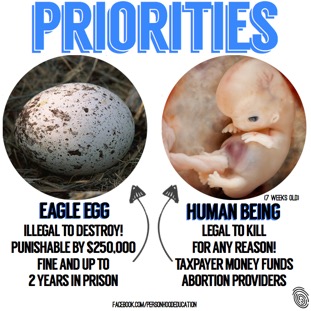
I’m a conservative, and most of my Facebook friends are conservative, too. Thus, my news feed is reliably peppered with memes like this one:

The intention behind memes like this is to use logic for a good cause. “If I expose the holes in pro-abortion arguments,” thought the sweet elderly lady who posted this, “then maybe people will change their minds about abortion, vote for pro-life candidates who will appoint conservative justices, and progressively outlaw abortion in America.” In the very simplest sense, this is a worthy goal. A widespread and reprehensible practice is something we should all work to prevent.
The problem with the sweet old lady’s strategy is that it is galactically ineffective. It will get “likes” and vigorous head-nods from her fellow pro-life conservatives. It may provoke an argument with a pro-abortion Facebook friend, if she has one. But it will almost certainly not change anyone’s mind about abortion, much less deter a woman from seeking abortion.
Why? Because the sweet old lady doesn’t know what an abortion-seeker looks like, thinks, or needs. She’s been sucked into the ping-pong game of political arguments and forgotten about the people who matter: the women considering abortion.
We are all prone to the sweet old lady’s mistake, especially near election time, which seems to infect even the sweetest people — conservative or liberal — with a nasty strain of seasonal political rabies. So, if you’re tired of arguing until you’re blue in the face and want to make a difference, here are four constructive, non-rabid channels where you can direct your energies.
1. Help Single Mothers
The typical abortion seeker is a low-income mother — usually single — from an ethnic or racial minority. These mothers feel they must continue to support their already-born children and therefore cannot quit working to care for an infant, or afford to pay for childcare. (This does not, of course, describe absolutely all abortion seekers, but it covers the bulk of them. Teens and affluent, educated, white, married women account for comparatively few of the women who consider abortion.)
If you want to make a pro-life impact, do something — anything — helpful for women like this. Offer to babysit or bring groceries; rent out your pool house at a discount; help with gas or car repairs, help with the kids’ school supplies; offer to edit the mother’s resume as she seeks a better job; coach her on job-searching, interviewing well, or getting promoted where she is; help her apply for any public aid she legitimately needs — anything to show her she need not choose between her present and future children.
What if you don’t know anyone who’s considering abortion? Help the single mothers you know anyway. It will help give hope to women who feel unsupported. If the norm is for single mothers to be left on their own — forced to sacrifice one of their children for the others — then they will be more likely to seek abortion. If the norm is for good people to offer provide legitimate, effective assistance, they will be more likely to have the courage to keep an unborn child and not view it as a threat to their older children’s well-being.
2. Raise Your Own Kids Well, and Don’t Complain
Not all abortion-seekers are hard-working, honest single mothers who love their children. Some are just average people who think children are little brats and don’t want to be burdened by them. They see children throwing tantrums, bullying each other, trashing restaurants, sassing their parents, becoming more spoiled and unbearable the older they get. It’s no wonder they don’t want little monsters of their own.
Work to correct this perception. If you have kids, teach them to behave well, and don’t spoil them. Require them to respect you as a parent, and that will teach them to respect others. Knowing just a few nice, pleasant children can truly change a person’s perspective on child-bearing in general.
Perceptions of children come not only from the kids themselves, but from the parents’ attitude. Parents who complain constantly and resent their children’s effect on their lives are not only a drag to be around, they scare potential parents away. There’s nothing like a bitter, cranky, Debbie Downer mother to make parenthood seem like a disaster to be avoided at all costs.
3. Move Beyond Outdated Arguments
With 3D imaging and other advances in science and embryology, there is no longer much point in arguing about whether an unborn baby “counts” as a human life. Pro-abortion leftists increasingly acknowledge that it does. The increasing approval of euthanasia in our culture should clue us in to the fact that leftists don’t deny that someone is human — they just don’t care. Or they claim to care, but subscribe to a made-up algorithm that deems some humans less entitled to the privileges of, say, not being killed and dismembered, than others.
Updating our rhetoric requires listening. Abortion advocates are, for the most part, no longer arguing the inanimate “clump of cells” idea. So what are they arguing? We have to ask, listen, and respond thoughtfully.
To me, it seems that most pro-abortion rhetoric is about some rights taking precedence over others — a woman’s right to privacy taking precedence over an infant’s right to live. Pro-life conservatives need to put pressure on this ranking system and ask, “Who takes precedence over whom? Why?” Dissecting and exposing the cruel logic of this system stands a chance of being much more persuasive than continuing to shout slogans (however true they may be) like “It’s a child, not a choice.”
4. Mentor Poor Kids, Especially Boys
Most abortions occur in poor communities, where stable families are not the norm. Kids who grow up without mutually supportive parents don’t know how to be mutually supportive as adults. This hurts women more than men, as it leaves them to raise children on fewer resources with less help.
To repair this injustice, boys need to be taught responsibility. More specifically, they need to be taught how not to abandon women. But who will teach them? Ideally, it would be their own parents, but we know this is not always going to happen. Somehow, kids in poor communities need contact with stable, responsible adults. Teachers are already spread too thin, especially in struggling schools.
Individual conservatives need to make themselves available for this kind of contact. Big Brothers/Sisters, church youth groups, and other formal mentorship programs are good avenues for this, although informal mentorship is usually more effective. But how to set up the richer, more mysterious phenomenon of informal mentorship? It’s essentially a mystery.
Charles Murray points out that America’s two social classes interact with one another less and less as time goes on. One solution shows up in Joy Pullmann’s article on charter schools, where tuition-free, quality education can expose less fortunate students to teachers and parents whose example could change their lives and — perhaps more importantly — their future unborn children’s lives.









